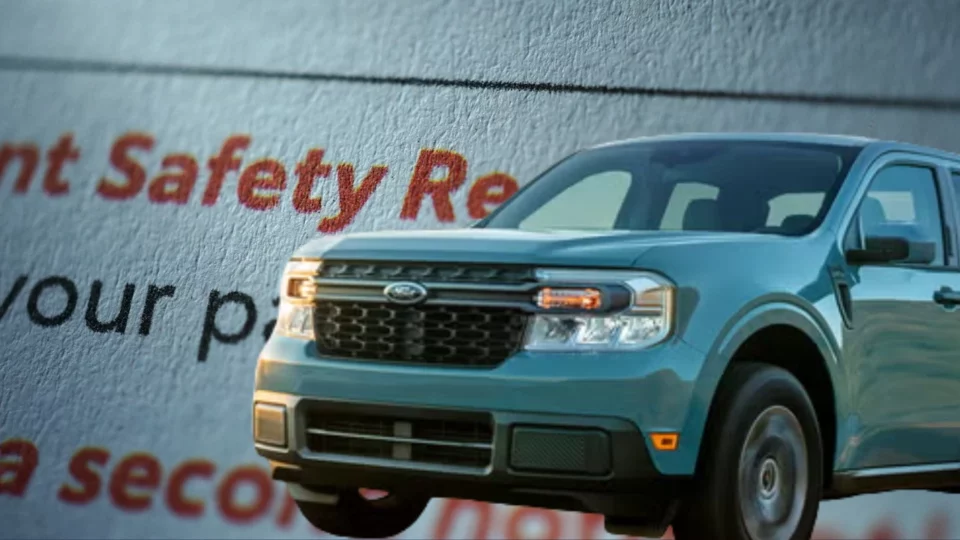Ford’s Maverick pickup truck has become one of the most popular small trucks in recent years, admired for its balance of affordability, Ford Recalls Hundreds of Thousands of Maverick Pickup Trucks. efficiency, and modern features. However, recent developments have brought attention to a serious issue that prompted Ford to recall hundreds of thousands of these vehicles. While recalls are not uncommon in the automotive industry, this particular event has raised important questions about vehicle safety, quality control, and how manufacturers handle large‑scale fixes.
This article explores the reasons behind the recall, the implications for drivers, and what owners need to know to stay safe and informed.
Background
The Ford Maverick was introduced as a compact pickup truck aimed at consumers who wanted a practical vehicle that was easy to maneuver, fuel‑efficient, and versatile for daily use. Its strong demand and popularity quickly turned it into one of Ford’s most successful launches.
However, as production scaled up to meet growing interest, some issues started to emerge that affected a large number of units on the road. These issues, once investigated, eventually led to a widespread recall covering a significant portion of Maverick trucks manufactured over a specific period.
Reason for the Recall
The recall of hundreds of thousands of Maverick pickup trucks stemmed from concerns about a component or system that did not meet expected safety or performance standards. While the specific defect may vary depending on the recall notice, typical reasons include:
- Faulty hardware or mechanical components that could fail under certain driving conditions.
- Electrical or sensor malfunctions that affect essential safety features.
- Software issues leading to improper vehicle responses during operation.
Regardless of the exact cause, Ford’s decision to initiate a recall shows a recognition of the potential risk to drivers and passengers if the problem is left unaddressed.
Impact on Owners
For those who own a Maverick truck affected by the recall, the immediate question is how this impacts their safety and day‑to‑day usage. Most recalls do not require owners to stop driving their vehicles unless the risk is extremely severe. However, it is important for drivers to pay attention to official instructions, which usually include:
- Scheduling a service appointment with a certified dealership.
- Receiving repairs or replacements free of charge.
- Getting updates on parts availability if a fix requires new components.
Owners are typically notified by mail or email about whether their truck is included in the recall, along with steps to confirm eligibility using their vehicle identification number (VIN).
Ford’s Response
Ford, like other major automakers, has a well‑established recall process. Once a potential defect is confirmed, the company works with regulatory authorities to define the affected models and years, then issues notifications to dealerships and customers.
In the case of the Maverick recall, Ford’s action to recall hundreds of thousands of trucks demonstrates a proactive approach to addressing safety concerns. The company is responsible for covering all associated repair costs, including labor and parts, ensuring owners do not have to bear additional expenses.
Lessons for the Industry
Large recalls like this one highlight the complexity of modern vehicle production. Trucks today combine intricate mechanical systems with advanced electronics and software, meaning even a minor fault can have broad consequences.
For automakers, these situations reinforce the importance of:
- Rigorous testing during development and after release.
- Rapid response systems to address issues as soon as they surface.
- Clear communication with customers to maintain trust.
For consumers, it is a reminder to stay informed about recalls for any vehicle they own and to respond quickly to manufacturer notifications.
Steps for Maverick Owners
If you own a Ford Maverick pickup truck, here are practical steps to take:
- Check your VIN. Use the official recall lookup tools provided by Ford or government websites to see if your vehicle is affected.
- Schedule a repair. Contact your local dealership to arrange for service. Appointments are usually free of charge and can be completed within a few hours once parts are available.
- Follow up if necessary. If replacement parts are on backorder, confirm your place in the queue and monitor updates regularly.
- Stay informed. Keep records of all recall notices and completed repairs for future reference.
Long‑Term Reputation
The Maverick remains a strong contender in the small pickup market, and most owners continue to appreciate its unique blend of features. Recalls, while inconvenient, do not necessarily diminish a vehicle’s overall value if the issue is corrected properly and promptly.
In fact, automakers who handle recalls transparently often retain customer loyalty. Ford’s willingness to address the problem across hundreds of thousands of vehicles suggests a commitment to maintaining confidence in the Maverick brand.
Conclusion
The recall of hundreds of thousands of Ford Maverick pickup trucks underscores the importance of safety oversight in the automotive industry. While no driver enjoys dealing with a recall, these actions ensure that vehicles remain safe and reliable over time.
For Maverick owners, responding quickly to the recall notice and completing the necessary repairs is the best way to ensure peace of mind. For Ford, this is an opportunity to demonstrate accountability, quality assurance, and customer care—all of which are essential to sustaining trust in a competitive market.
